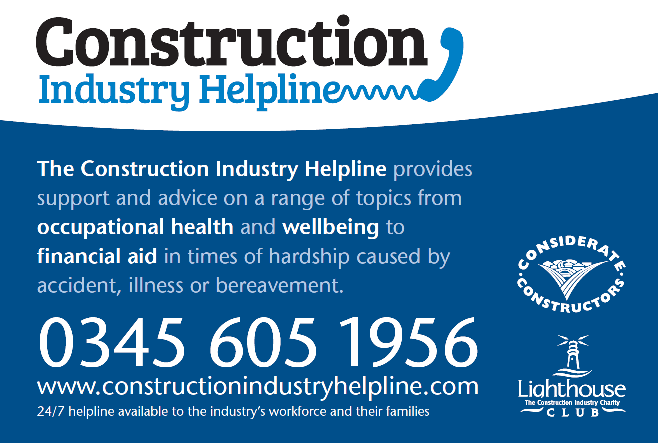
The Construction Industry Helpline was set up a few years ago to provide support and advice to those working in the construction industry on a range of topics – from wellbeing to financial aid. Bill Hill, CEO, explains who it is aimed at, how it works and give his practical tips for health and safety managers.
Who is the helpline aimed at?
Quite simply the Construction Industry Helpline is there for any construction worker and their family.
From steel fixer to surveyor or ground worker and plant hire operator to architect, this 24/7 helpline is always there as a safety net for everyone in the construction community.
The industry has a high proportion of self employed and subcontracted labour and there are very few large companies that directly employ people to fulfil major construction contracts.
Those individuals lucky to be employed directly by a major contractor often have access to an employee assistance programme (EAP). However, for the vast majority the opportunity to access an employee assistance programme is non-existent. Thanks to the generosity of the construction industry our charity can provide a basic EAP for everyone.
We deliver emergency financial aid for families in poverty as a consequence of an accident, illness or fatality of a construction worker.
We also provide assistance to those requiring support on issues such as stress, anxiety, addiction and depression as well as taxation and legal advice which can often be complicated and difficult to understand.
This helpline is not only for current workers, we also support past and retired workers that have done their bit for our industry, whether they were working on highways, railways or buildings.

Working in construction you are six times more likely to die from suicide than from a fall from height. What do you think it is about the industry that seems to place so much pressure on workers?
Mental health or inner wellbeing and resilience is a very new area for the industry to tackle.
Sixty years ago the industry lost over 200 people a year due to accidents on site and thanks to a huge focus on safety this number is down to on average 40 a year. This is still 40 too many and I am sure the safety record will continue to improve.
However, though extrapolation of the statistics relating to suicide there could be somewhere in the region of 250 – 500 male suicides a year of workers in construction. Along with the very recent public support from the royal family and the prime minister, the industry has now got this issue firmly in its sights and we will see an accelerated programme of initiatives to understand, identify and address the underlying problems manifesting in the individual’s state of mind that might lead to a potential suicide.
The Health in Construction Leadership Group is a relatively new organisation launched last year to focus on health and as its name suggests it was set up to lead the industry initiatives to tackle these problems. It is vitally important that we stick together as an industry to put in place robust programmes that can be implemented from the largest to the smallest of operators.
However, this is no easy task as the culture of construction is very macho and it will take some time for individuals to feel comfortable about declaring vulnerability and seek help without being judged.
Work has already started and organisations like Network Rail have already deployed a series of educational videos that demonstrate how individuals can confront mental health problems in the workplace.
What sort of issues concerning mental health do people tend to be seeking help and advice for?
Mental health is multi-faceted and complex. We can easily have somebody present themselves to our helpline as needing financial support or debt advice but underlying this practical problem is depression and anxiety, this then could affect their work through a lack of concentration while operating machinery.
Ultimately an individual’s problem with money could inadvertently cause a serious accident at work. We will never be able to directly quantify the impact of our helpline and other programmes in this area are making but I think everyone can see the common sense in making sure we do as much as possible to give everyone practical help and coping strategies for their mental health issues.
What more can managers do to make sure they are approachable and open to discussions about mental health?
Cultural change is critical to creating an environment where anyone in our industry, no matter what their job function and especially men, can declare they are feeling anxious, stressed or depressed within themselves or about a situation that they are confronted with.
Then after they have mustered up the courage to declare they are not coping, it is how this is handled that will lead to ultimate success. Whether it is through our helpline or via a work colleague on site, this information needs to be responded to in the appropriate manner and we need to give that individual access to tools and services to improve their inner well being and resilience.
As a charity we are working with Mates in Mind, an initiative coming out of the Health in Construction Leadership Team that has harnessed the knowledge of MIND, Mental Health First Aid and the Samaritans along with input from an Australian programme called Mates in Construction to deliver an education programme to upskill volunteers on construction sites to identify, engage and help workers on site through mental health issues.
These Mental Health First Aiders will be the local physical access point to help. However, should an individual wish to keep the support they need at arms length, then we are also working with Building Site to Boardroom (BS2B).
This is an online educational programme based on the key principles of mindfulness to equip individuals with coping strategies to some of the underlying mental health issue of anxiety, stress and depression. The educational assets can be accessed via a smartphone or a computer and are fully hones to the construction industry. Our charity will be providing the 24/7 helpline to both these projects.
What can the industry do to help support this service and ensure workers always have somewhere to turn for help and advice?
Our charity has been in operation for over 60 years delivering welfare and benevolent support to our industry. We receive no public funding and rely totally on the generosity of the industry to help its own.
Mental health is an area that we are extremely concerned about and we look forward to collaborating with many agencies and other charities to weald together innovative and practical solutions to support our workforce.
Thanks to Considerate Constructors our Construction Industry Helpline poster has been distributed to over 9,000 construction sites. We now need the underlying educational programmes to encourage our workforce to see that declaring a weakness is actually a sign of strength.
Our construction industry is well known for delivering training and developing specialist tools to overcome practical infrastructure construction problems.
In the long term, I am equally enthused that our industry will use this problem solving ability to address the infrastructure problems of the mind.
For more information, visit the Construction Industry Helpline website, or call the helpline: 0845 605 1956. Calls cost 5p per minutes plus your company’s access charge.

What makes us susceptible to burnout?
In this episode of the Safety & Health Podcast, ‘Burnout, stress and being human’, Heather Beach is joined by Stacy Thomson to discuss burnout, perfectionism and how to deal with burnout as an individual, as management and as an organisation.
We provide an insight on how to tackle burnout and why mental health is such a taboo subject, particularly in the workplace.




